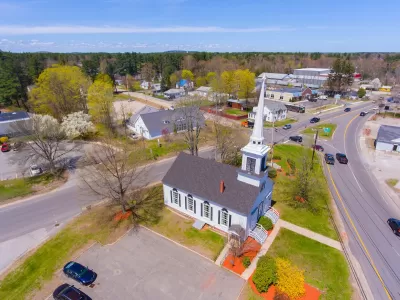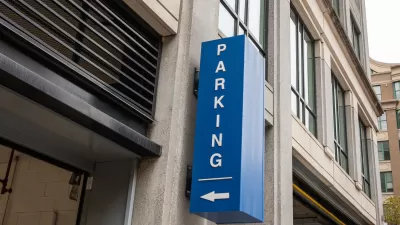Small towns and communities around the country are eliminating parking requirements at a faster rate than big cities.

In an article for Sightline, Catie Gould provides three examples of small towns that have eliminated parking minimums, noting that more small towns have done so than big cities. According to Gould, “While large cities like San Jose, California, and Austin, Texas, garner national press coverage for eliminating parking mandates, this policy reform is most commonly enacted in towns with fewer than 25,000 residents.”
For every U.S. city with populations of over 250,000 that has repealed parking requirements, two small towns (under 25,000) have done so. This is in part due to the fact that there are more small towns than big cities — “But small jurisdictions are also likely underrepresented in the Parking Reform Network data. With little to no media coverage of zoning changes in places like Gilman, Wisconsin, or Canandaigua, New York, those parking reforms are less likely to make it onto the map in the first place.” Gould also points out that many small and rural communities never enacted parking mandates in the first place.
Gould highlights Ecorse, Michigan, where deindustrialization and population loss left the town with ample underused parking and vacant buildings. Eliminating parking requirements has made it easier to redevelop properties, says town planner Nani Wolf.
FULL STORY: Twice As Many Small Towns Have Eliminated Parking Mandates As Large Cities

Alabama: Trump Terminates Settlements for Black Communities Harmed By Raw Sewage
Trump deemed the landmark civil rights agreement “illegal DEI and environmental justice policy.”

Planetizen Federal Action Tracker
A weekly monitor of how Trump’s orders and actions are impacting planners and planning in America.

How Atlanta Built 7,000 Housing Units in 3 Years
The city’s comprehensive, neighborhood-focused housing strategy focuses on identifying properties and land that can be repurposed for housing and encouraging development in underserved neighborhoods.

In Both Crashes and Crime, Public Transportation is Far Safer than Driving
Contrary to popular assumptions, public transportation has far lower crash and crime rates than automobile travel. For safer communities, improve and encourage transit travel.

Report: Zoning Reforms Should Complement Nashville’s Ambitious Transit Plan
Without reform, restrictive zoning codes will limit the impact of the city’s planned transit expansion and could exclude some of the residents who depend on transit the most.

Judge Orders Release of Frozen IRA, IIJA Funding
The decision is a victory for environmental groups who charged that freezing funds for critical infrastructure and disaster response programs caused “real and irreparable harm” to communities.
Urban Design for Planners 1: Software Tools
This six-course series explores essential urban design concepts using open source software and equips planners with the tools they need to participate fully in the urban design process.
Planning for Universal Design
Learn the tools for implementing Universal Design in planning regulations.
Caltrans
Smith Gee Studio
Institute for Housing and Urban Development Studies (IHS)
City of Grandview
Harvard GSD Executive Education
Toledo-Lucas County Plan Commissions
Salt Lake City
NYU Wagner Graduate School of Public Service





























